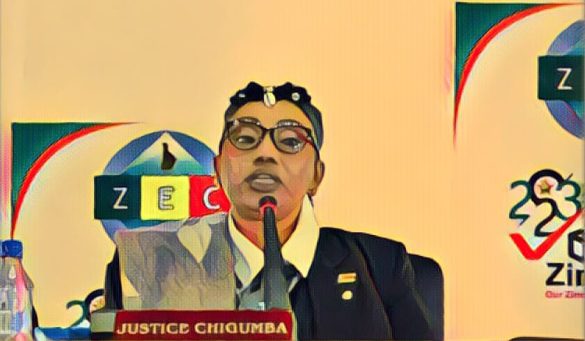Zimbabwe’s ruling party, ZANU PF, has praised the country’s electoral commission for conducting a “flawless” election in August 2023, despite widespread allegations of fraud and irregularities by the opposition and international observers.
The legislators were debating the report of the Zimbabwe Electoral Commission (ZEC) on the harmonized elections, which gave President Emmerson Mnangagwa a narrow victory over his main challenger, Nelson Chamisa of the Movement for Democratic Change Alliance (MDC-A).
The election was marred by violence, intimidation, and legal challenges, and was rejected by several observer missions, including those from the Southern African Development Community (SADC), the African Union (AU), the European Union (EU), and the Carter Center.
ZANU PF lauds ZEC
Mberengwa South MP Tafanana Zhou commended ZEC for carrying out a successful delimitation exercise, allowing multiple observers, and producing a timely report.
“I would like to congratulate ZEC for a job well done before the elections when they dealt with the issue of the delimitation commission. They did very well in delimitation of the constituencies,” he said.
“I would once again like to congratulate them on a job well done when they allowed observers into our country during the general elections. They allowed several observers from different countries who came to observe the elections.”
“Indeed, the elections were conducted well and they were very transparent. We would also like to thank them for the timely production of their report which was done a short time just after the completion of the elections.”
He also applauded ZEC for conducting elections peacefully.
Goromonzi West legislator Biatha Karimatsenga-Nyamupinga said ZEC held the key to the public and international perception of free, fair, and credible elections.
“Whatever challenges were later encountered, they had nothing to do with lack of timeous funding, but only the work ethics and competencies of ZEC and other factors beyond ZEC’s control. The 2023 harmonized elections were characterized by peace, before, during, and after elections,” she said.
“I commend the people of Zimbabwe for that and ZEC for laying that foundation, where generally the public awareness and access to materials was transparent, hence the confidence and trust in the process.”
Karimatsenga-Nyamupinga also commended ZEC for conducting voter education that was balanced, gender and culture-sensitive, and using social media to counter fake news.
Opposition and observers dispute the results
However, the opposition and some observers disputed the results and the conduct of ZEC, accusing it of bias and manipulation in favor of ZANU PF.
Chamisa, who claimed to have won the election, challenged the results in the Constitutional Court, but his petition was dismissed for lack of evidence.
The EU observer mission said the election was held in an “improved political environment”, but “lacked a level playing field” and “did not meet international standards”.
The AU observer mission said the election was “largely peaceful and orderly”, but “fell short of meeting some key benchmarks for democratic elections”.
The SADC observer mission said the election was “generally peaceful and well-managed”, but “not without challenges and shortcomings”.
The Carter Center observer mission said the election was “an important opportunity for Zimbabwe to move forward”, but “was marred by significant shortcomings in the pre-election environment and election day”.
Despite the controversy and criticism, some analysts and civil society groups have expressed hope that the election could pave the way for dialogue and reforms in Zimbabwe, which has been struggling with economic and political crises for decades.
They have called on the government and the opposition to engage in constructive talks and address the root causes of the country’s problems, such as poverty, corruption, human rights violations, and lack of democracy.
They have also urged the international community to support Zimbabwe’s efforts to rebuild its institutions, restore its rule of law, and revive its economy.
Source: Newsday Zimbabwe


